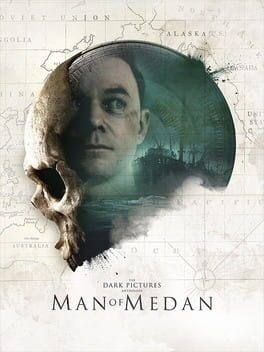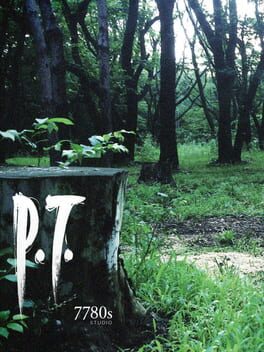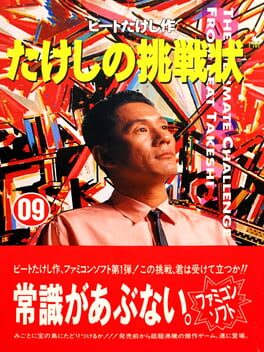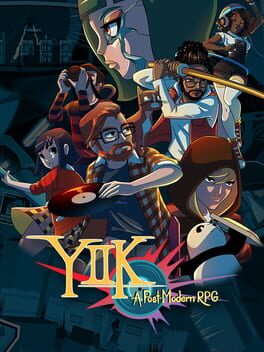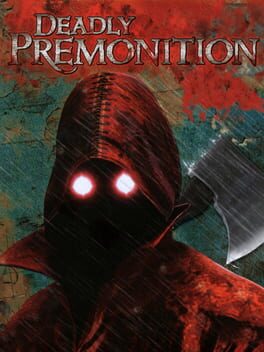RustyPatriot
26 reviews liked by RustyPatriot
P.T.
2014
P.T.
2014
I had to see this one with my own two eyes for some twisted and self hurting reason, and boy was everyone right about how baffling and grueling of a self absorbed mess this one is. To me, YIIK represents the apex of the indie scene's obssession with the egocentric tortured artist narrative that has been the go-to window dressing for many of the critical darlings of the last decade, mostly due to how badly it fails on the execution of said concept.
Andrew Allanson makes his case for Alex's incredible lack of charisma and likeability by implying that those were intented attributes deliberately written to present an unlikely protagonist that defies the expectations of videogame conventions and serves to tell a "meaningful and thought provoking" narrative, but I do have to question if Andrew understands that you can write unredeemable pieces of shit and still have them be compelling people to follow, not unlike the characters from the inumerous prestigious novels and movies he so eagerly name drops as influences. The voice behind Alex's obnoxious and verbose inner thoughts and social interactions permeates most of YIIK's world and people, bloating the whole experience with an onslaught of solipsistic musings that would make your teen self cringe and inner world exposition dumps that would make Kojima blush, and a group of characters lacking in so much chemistry and entertaining banter that fill the game's dead air with loud meaningless conversations that made me appreciate how much of an art what Persona does is.
Tying it all up, you have one of the most unpleasant combat systems I have ever had the displeasure of experiencing in an rpg. A third of the way through I had to turn on Story Mode and Assist Mode while fast forwarding as much as I could, and I shudder to think of the people who subjected themselves to the rest of the game without resorting to any of those settings. There are design choices made here where I struggle to believe that someone made them without deliberately trying to make this combat system a living hell to wrestle with for 20 hours. Andrew infamously stated that if people aren't able to appreciate his game, then "games aren't art, but toys for children", an idea that I find very insincere when he himself has brushed aside the strengths of the medium as mere tools in service of his literary interests and fails to recognize the gameplay value of the many games he apes from and that already disprove his perception of the audience.
I have seen comparisons made between YIIK and The Room, and while YIIK's team has immensely more talent than whatever Tommy Wiseau has, I do see where that's coming from. You aren't so much in it to experience the art presented to you, as much as you are to see the psychosis of the artist behind it, and YIIK does have its poignant and head turning moments that reach Pathologic levels of antagonism towards the player that reveal some kind of accidental genius behind its aggresively mediocre facade. Not only does the world of YIIK unironically revolve around Alex by the end of the game, he implicates you in his self importance and passes onto you his responsibilities and obligations to be a better person, and I find the audacity and nerve to do that...kinda brilliant??, more so deserving of the pretentious "Postmodern RPG" moniker than the Earthbound/Mother 3 gimped 4th wall breaks or the doubt seered into me each time the loading screen tip "videogames are not a waste of time" popped up.
And dont get me wrong, thinking that YIIK is some misunderstood masterpiece of game design or secretely a arthouse cult classic in the making. Judging by Andrew's defensive posture when talking about the game's reception and the passive aggressiveness he slides into the game's updates, much of the artistic merit that can be inferred from YIIK is most likely just a pure casualty of someone trying to aspire to his influences and falling way short of the mark, and suggesting that most of it was intentional would be implying that someone could have the talent to consciously write and design as badly as YIIK was. But Andrew made art here, not the kind of art he wanted to make, but art nonetheless, and I do find more value in this relentlessly life draining game than most indie artsy fartsy games out there. I play YIIK and I see a sincere attempt at creating something unique and different, scrambling ideas from every piece of fiction the creator cherishes and throwing it at the wall to see what sticks, not having the self awareness to realize its own mediocrity or how misplaced and misguised many of those ideas might be, and I can definitely sympathize and relate to that.
PS: The Iwata "tribute" is the most unintentionally hilarious bit in the whole game. You have the power of videogames to make anything you want, and you put the man in a fucking tombstone.
Andrew Allanson makes his case for Alex's incredible lack of charisma and likeability by implying that those were intented attributes deliberately written to present an unlikely protagonist that defies the expectations of videogame conventions and serves to tell a "meaningful and thought provoking" narrative, but I do have to question if Andrew understands that you can write unredeemable pieces of shit and still have them be compelling people to follow, not unlike the characters from the inumerous prestigious novels and movies he so eagerly name drops as influences. The voice behind Alex's obnoxious and verbose inner thoughts and social interactions permeates most of YIIK's world and people, bloating the whole experience with an onslaught of solipsistic musings that would make your teen self cringe and inner world exposition dumps that would make Kojima blush, and a group of characters lacking in so much chemistry and entertaining banter that fill the game's dead air with loud meaningless conversations that made me appreciate how much of an art what Persona does is.
Tying it all up, you have one of the most unpleasant combat systems I have ever had the displeasure of experiencing in an rpg. A third of the way through I had to turn on Story Mode and Assist Mode while fast forwarding as much as I could, and I shudder to think of the people who subjected themselves to the rest of the game without resorting to any of those settings. There are design choices made here where I struggle to believe that someone made them without deliberately trying to make this combat system a living hell to wrestle with for 20 hours. Andrew infamously stated that if people aren't able to appreciate his game, then "games aren't art, but toys for children", an idea that I find very insincere when he himself has brushed aside the strengths of the medium as mere tools in service of his literary interests and fails to recognize the gameplay value of the many games he apes from and that already disprove his perception of the audience.
I have seen comparisons made between YIIK and The Room, and while YIIK's team has immensely more talent than whatever Tommy Wiseau has, I do see where that's coming from. You aren't so much in it to experience the art presented to you, as much as you are to see the psychosis of the artist behind it, and YIIK does have its poignant and head turning moments that reach Pathologic levels of antagonism towards the player that reveal some kind of accidental genius behind its aggresively mediocre facade. Not only does the world of YIIK unironically revolve around Alex by the end of the game, he implicates you in his self importance and passes onto you his responsibilities and obligations to be a better person, and I find the audacity and nerve to do that...kinda brilliant??, more so deserving of the pretentious "Postmodern RPG" moniker than the Earthbound/Mother 3 gimped 4th wall breaks or the doubt seered into me each time the loading screen tip "videogames are not a waste of time" popped up.
And dont get me wrong, thinking that YIIK is some misunderstood masterpiece of game design or secretely a arthouse cult classic in the making. Judging by Andrew's defensive posture when talking about the game's reception and the passive aggressiveness he slides into the game's updates, much of the artistic merit that can be inferred from YIIK is most likely just a pure casualty of someone trying to aspire to his influences and falling way short of the mark, and suggesting that most of it was intentional would be implying that someone could have the talent to consciously write and design as badly as YIIK was. But Andrew made art here, not the kind of art he wanted to make, but art nonetheless, and I do find more value in this relentlessly life draining game than most indie artsy fartsy games out there. I play YIIK and I see a sincere attempt at creating something unique and different, scrambling ideas from every piece of fiction the creator cherishes and throwing it at the wall to see what sticks, not having the self awareness to realize its own mediocrity or how misplaced and misguised many of those ideas might be, and I can definitely sympathize and relate to that.
PS: The Iwata "tribute" is the most unintentionally hilarious bit in the whole game. You have the power of videogames to make anything you want, and you put the man in a fucking tombstone.
Deadly Premonition
2010
The Beginner's Guide
2015
This review contains spoilers
Recommended by gomit as part of this list.
When I was in middle school, I pirated a copy of RPG Maker VX Ace and said "I'm going to make a video game." My very first project was a joke game based on those MLG memes (the air horns, the crosshairs, "MOM GET THE CAMERA!", the works) and it was rough. Even in the limited, easy-to-use confines of RPG Maker, I could barely figure out how to program a map transition, or even set up a basic variable flag. I managed to program one boss fight and gave up. Over the years, ideas would come and go, only ever ending up half-baked ideas that were excuses to try something new, like writing music or learning digital art. An isometric Bully-clone. A Persona 3-style dungeon crawler. The mandatory Quirky Earthbound-Inspired RPG that all indie developers make at some point. A cosmic-horror JRPG with anime girls. All of these ideas living in the margins of sketchbooks or as slap-dash digital sprites drawn with my shitty dollar store mouse. It would take me until I was 20 (7 whole years from the day I pirated that copy of VX Ace!) to actually publish my first completed project. I would feign to call myself a "game developer", but I bring this up because I think it's a substantial part of my life that colors my view of The Beginner's Guide.
The Beginner's Guide is an hour long interactive experience that serves as a commentary on both artist and audience, and the relationship between the two. Before the twist revealed in the second to last chapter of the game, the use of this fictional developer (Coda), their oeuvre, and the Director's Commentary provided by the psuedo-fictional caricature of The Beginner Guide's own creator (Wreden) weave this tale of artistic expression and burnout through the medium most infamous for how it chews up and spits out its creators: video games. The arc we witness of finding the joy in creation, fixating on some kind of platonic ideal for your work, before spiraling and losing your passion, realizing that you're burnt out and that throwing yourself in the grinder day-in day-out isn't going to give you the results you want is something that I as a struggling creative myself can sympathize with.
But after that twist is revealed, that Coda didn't burn out from creative strain, but from being subject to an audience that wanted to live vicariously through his work and pick apart his very being, there is a much more universal struggle revealed: the need for validation and external approval, and the purpose of art. Wreden using Coda's work to validate himself by presenting it to other people, despite Coda's wish to keep his work private; Wreden modifying Coda's games to provide more concrete meaning so as to fit in-line with Werden's sensibilities, even when it was established in an earlier chapter that Coda believed that games didn't need to be so objective or finished; Werden trying so hard to understand Coda's work that he armchair analyzes a creative, when Coda never meant nor really wanted his work to be so emotionally open and raw. The age of hours-long YouTube video essayists and Armchair Critics on Media Logging Websites (wink wink nudge nudge) have made all of this behavior resonate years after release, of people trying to gain validation by analyzing art and showing that they get it, using media as a springboard to share their own ideas and struggles, gain their own audience via their ability to read into art, commodifying the idea of the creative and their struggles to make their body of work seem so much more unique and genuine and meaningful. Publishing anything runs that risk but nowadays putting even the slightest fragment of your soul into something potentially thousands if not millions can observe and pick apart and psychoanalyze borders on cosmic horror.
It begs the question of what art and self-expression is supposed to do for an audience. Do we really know an artist just because they made something emotionally vulnerable? Do we know them even if the art isn't overtly personal? Is it bad to not look into a work? Is it bad to look too much into something? How much should we analyze of an author's persona, and at what point does it stop being media analysis and shift into armchair psychology? That last minute twist raises a lot of tough questions about how we as consumers engage with art and what makes it work so well is that the twist doesn't invalidate the first 95% of the game. It manages to be about two conflicting subjects without really cancelling each other out with the questions being raised by both halves of the game, and as both artist and critic, I don't have any real answers for the conundrums it presents. Would it have been better to look at this as a metaphor for Werden and his release of Stanley Parable, or is that doing exactly what the Werden in Beginner's Guide did by trying to read into someone's personal life based solely on their published work? Am I wrong to have tried to connect this piece of art to my own life experiences, or did it help enhance my enjoyment? Am I engaging with this medium correctly by writing all these words? Would I ever want this to happen to me and my own body of work?
Who knows.
When I was in middle school, I pirated a copy of RPG Maker VX Ace and said "I'm going to make a video game." My very first project was a joke game based on those MLG memes (the air horns, the crosshairs, "MOM GET THE CAMERA!", the works) and it was rough. Even in the limited, easy-to-use confines of RPG Maker, I could barely figure out how to program a map transition, or even set up a basic variable flag. I managed to program one boss fight and gave up. Over the years, ideas would come and go, only ever ending up half-baked ideas that were excuses to try something new, like writing music or learning digital art. An isometric Bully-clone. A Persona 3-style dungeon crawler. The mandatory Quirky Earthbound-Inspired RPG that all indie developers make at some point. A cosmic-horror JRPG with anime girls. All of these ideas living in the margins of sketchbooks or as slap-dash digital sprites drawn with my shitty dollar store mouse. It would take me until I was 20 (7 whole years from the day I pirated that copy of VX Ace!) to actually publish my first completed project. I would feign to call myself a "game developer", but I bring this up because I think it's a substantial part of my life that colors my view of The Beginner's Guide.
The Beginner's Guide is an hour long interactive experience that serves as a commentary on both artist and audience, and the relationship between the two. Before the twist revealed in the second to last chapter of the game, the use of this fictional developer (Coda), their oeuvre, and the Director's Commentary provided by the psuedo-fictional caricature of The Beginner Guide's own creator (Wreden) weave this tale of artistic expression and burnout through the medium most infamous for how it chews up and spits out its creators: video games. The arc we witness of finding the joy in creation, fixating on some kind of platonic ideal for your work, before spiraling and losing your passion, realizing that you're burnt out and that throwing yourself in the grinder day-in day-out isn't going to give you the results you want is something that I as a struggling creative myself can sympathize with.
But after that twist is revealed, that Coda didn't burn out from creative strain, but from being subject to an audience that wanted to live vicariously through his work and pick apart his very being, there is a much more universal struggle revealed: the need for validation and external approval, and the purpose of art. Wreden using Coda's work to validate himself by presenting it to other people, despite Coda's wish to keep his work private; Wreden modifying Coda's games to provide more concrete meaning so as to fit in-line with Werden's sensibilities, even when it was established in an earlier chapter that Coda believed that games didn't need to be so objective or finished; Werden trying so hard to understand Coda's work that he armchair analyzes a creative, when Coda never meant nor really wanted his work to be so emotionally open and raw. The age of hours-long YouTube video essayists and Armchair Critics on Media Logging Websites (wink wink nudge nudge) have made all of this behavior resonate years after release, of people trying to gain validation by analyzing art and showing that they get it, using media as a springboard to share their own ideas and struggles, gain their own audience via their ability to read into art, commodifying the idea of the creative and their struggles to make their body of work seem so much more unique and genuine and meaningful. Publishing anything runs that risk but nowadays putting even the slightest fragment of your soul into something potentially thousands if not millions can observe and pick apart and psychoanalyze borders on cosmic horror.
It begs the question of what art and self-expression is supposed to do for an audience. Do we really know an artist just because they made something emotionally vulnerable? Do we know them even if the art isn't overtly personal? Is it bad to not look into a work? Is it bad to look too much into something? How much should we analyze of an author's persona, and at what point does it stop being media analysis and shift into armchair psychology? That last minute twist raises a lot of tough questions about how we as consumers engage with art and what makes it work so well is that the twist doesn't invalidate the first 95% of the game. It manages to be about two conflicting subjects without really cancelling each other out with the questions being raised by both halves of the game, and as both artist and critic, I don't have any real answers for the conundrums it presents. Would it have been better to look at this as a metaphor for Werden and his release of Stanley Parable, or is that doing exactly what the Werden in Beginner's Guide did by trying to read into someone's personal life based solely on their published work? Am I wrong to have tried to connect this piece of art to my own life experiences, or did it help enhance my enjoyment? Am I engaging with this medium correctly by writing all these words? Would I ever want this to happen to me and my own body of work?
Who knows.
The Beginner's Guide
2015
What was initially a fascinating rabbit hole of interpreting a fictional game developer's oeuvre by examining key symbols & psyche, eventually turned into woefully brushing over decades of inner workings of artists turned into art & how a viewer can digest it. The game's message isn't inherently wrong for it is ultimately a work of how one can connect to art, but I cannot find myself to agree with what is suggested throughout.
Keep in mind, one does not necessarily have to unravel hidden meanings & deeper symbolic gestures in every piece they come across. Sometimes, it's even better to simply feel the emotive gall of a piece of art. Furthermore, the game indirectly suggests that a form of projection is taking place when overanalyzing art at times. To that, I have to say: correct. But this is what art is all about. Art, whatever your interpretation of it may be, is almost always a discussion between the artist & the viewer. It is a two-sided (sometimes more) dialogue that pricks at thee heart & mind in such a way that is ultimately life affirming.
Dave means well with this game. After all, it's one in which you could ultimately interpret, perhaps against his own wishes, that he himself is attempting to purge this state of thinking while experiencing art itself. But the "games" in this suggests that there is something going on underneath the surface of the creator in the metafiction here (aside of course, from literal symbolism that Dave is projecting into Coda's own games). By simply creating something, one is shedding skin for the audience to witness. One central message that Dave conveys is that an artist does not owe their audience anything, & to assume what the artist is experiencing when creating something without having a single idea what that might be can be dangerous. A cyclone of sorts forms, one that can potentially create a parasocial relationship with an artist that may be more dangerous than helpful.
Suffice it to say, a fair amount of points that Dave suggests in this game are not necessarily damaging to art or how we experience it (I generally disagree with them, but at times they hold some weight), but it all quickly becomes relatively disingenuous by the mere act of Dave purposefully going out of their way to create fictional games that seemingly have no meaning whatsoever. By the end, the mere existence of this game contradicts the point its trying to make, to some extent.
But maybe I'm only proving Dave's point. So be it.
Keep in mind, one does not necessarily have to unravel hidden meanings & deeper symbolic gestures in every piece they come across. Sometimes, it's even better to simply feel the emotive gall of a piece of art. Furthermore, the game indirectly suggests that a form of projection is taking place when overanalyzing art at times. To that, I have to say: correct. But this is what art is all about. Art, whatever your interpretation of it may be, is almost always a discussion between the artist & the viewer. It is a two-sided (sometimes more) dialogue that pricks at thee heart & mind in such a way that is ultimately life affirming.
Dave means well with this game. After all, it's one in which you could ultimately interpret, perhaps against his own wishes, that he himself is attempting to purge this state of thinking while experiencing art itself. But the "games" in this suggests that there is something going on underneath the surface of the creator in the metafiction here (aside of course, from literal symbolism that Dave is projecting into Coda's own games). By simply creating something, one is shedding skin for the audience to witness. One central message that Dave conveys is that an artist does not owe their audience anything, & to assume what the artist is experiencing when creating something without having a single idea what that might be can be dangerous. A cyclone of sorts forms, one that can potentially create a parasocial relationship with an artist that may be more dangerous than helpful.
Suffice it to say, a fair amount of points that Dave suggests in this game are not necessarily damaging to art or how we experience it (I generally disagree with them, but at times they hold some weight), but it all quickly becomes relatively disingenuous by the mere act of Dave purposefully going out of their way to create fictional games that seemingly have no meaning whatsoever. By the end, the mere existence of this game contradicts the point its trying to make, to some extent.
But maybe I'm only proving Dave's point. So be it.
